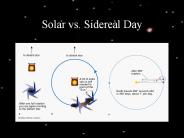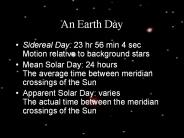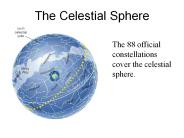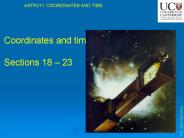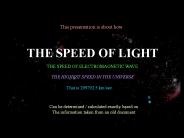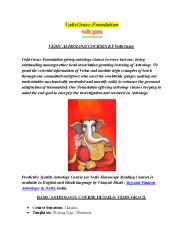Sidereal PowerPoint PPT Presentations
All Time
Recommended
Mean Solar Day: 24 hours. The average time between meridian crossings of the Sun ... Julian Year: 365.25 mean solar days. Used in calendars before 1582. ...
| PowerPoint PPT presentation | free to download
Sorting out synodic and sidereal years for planets. sidereal period of Earth = 1 y ... The Analemma [at center of time zone (latitude 0 , 15 , 30 . ...
| PowerPoint PPT presentation | free to view
Understand the differences between Sidereal and Tropical astrology in this practical guide to Zodleaf astrology for spiritual enrichment.
| PowerPoint PPT presentation | free to download
... noon, apparent solar day, mean sun, mean solar day, time zone, universal time. Box 2-2. sidereal time, sidereal day. Week 3 --- Eclipses and the Motion of the ...
| PowerPoint PPT presentation | free to view
Santa Barbara Instrument Group. Inc. Astro-Haven Domes. Karl Lambrecht Optical Co. ... Tracking/Guiding (RA and Dec) Sidereal/Moon/Planets/Sun ...
| PowerPoint PPT presentation | free to view
Generating Sidereal Time to point antennas. ... of mass in/on the earth over long periods of time (a.k.a. 'The Reference Frame' ...
| PowerPoint PPT presentation | free to view
1950: replace sidereal time with 'ephemeris time' This form of evidence can be very strong ... New second-order phenomena presuppose not only the theory of ...
| PowerPoint PPT presentation | free to download
Vernal equinox is the zero point for sidereal time. ... To avoid inconveniences we use a mean solar time. Standardization achieved with 24 time zones. ...
| PowerPoint PPT presentation | free to view
An Earth Day Sidereal Day: 23 hr 56 min 4 sec Motion relative to background stars Mean Solar Day: 24 hours The average time between meridian crossings of the Sun
| PowerPoint PPT presentation | free to download
Rotation Rate of Mercury Lab 9 Mercury Closest planet to Sun, ~ 0.4 AU Very small, even Ganymede is larger Very eccentric orbit ~0.308 - 0.467 AU Sidereal rotational ...
| PowerPoint PPT presentation | free to download
Analemma. Time. Mean Solar Time: Time based on the average time between meridian ... Apparent Solar Time: The actual hour angle of the Sun 12 hours ...
| PowerPoint PPT presentation | free to download
Historically, the regular motion of objects in the sky served as the basis ... and the terminology of timekeeping remain rooted in its astronomical heritage. ...
| PowerPoint PPT presentation | free to view
Edinburgh Ganzfeld Studies Condition N es. Sender - No Sender (Morris et al.) Sender 64 0.17. Creativity (Dalton) All 75 0.52. Drumming (Symmons & Morris) 7 Hz 25 0.54 ...
| PowerPoint PPT presentation | free to download
North and south celestial poles. Celestial equator. Celestial coordinates ... Long-Term Changes ? Precession. January 20, 2006. Center for Solar-Terrestrial Research ...
| PowerPoint PPT presentation | free to view
Most passes (full/new) moon is 'above' or 'below' ecliptic. ... When alignment occurs at full moon, shadow of Earth can cover moon. Umbra complete dark. ...
| PowerPoint PPT presentation | free to view
ASTR 2310 Chapter 1: Example Problems 1.4 You have access to a large telescope in the last week of September. You have targets in the constellations of Virgo and Pisces.
| PowerPoint PPT presentation | free to download
The Celestial Sphere The 88 official constellations cover the celestial sphere.
| PowerPoint PPT presentation | free to download
However, notice that it is not 'Noon' the next day. ... To reach Noon the next day requires the Earth to spin an additional amount to ...
| PowerPoint PPT presentation | free to view
0 360 measured eastwards around ecliptic. 90 90 angular distance from ecliptic ( = 0 ... ecliptic pole. P is the north. celestial pole. Prof. John Hearnshaw ...
| PowerPoint PPT presentation | free to download
Technical Problems (AOL) Over testing? A Valid Assessment? A Valid Assessment? The Ugly ... 'I understood that Copernicus also used epicycles in his model. ...
| PowerPoint PPT presentation | free to view
Lecture 3 ASTR 111 Section 002
| PowerPoint PPT presentation | free to download
only on equinox days (no matter what latitude) are these points due E or W ... Bighorn Medicine Wheel, Wyoming: spokes point toward sunrise/sunset points at solstices ...
| PowerPoint PPT presentation | free to view
Title: PowerPoint Presentation Author: Sumanas Last modified by: Norbert Bartel Created Date: 12/24/2002 1:08:46 AM Document presentation format: On-screen Show
| PowerPoint PPT presentation | free to download
B. Outer or Jovian planets - Jupiter, Saturn, Uranus, Neptune, Pluto. MERCURY. TOPIC 2: MERCURY ... Both are very small and very close! Captured Asteroids? ...
| PowerPoint PPT presentation | free to view
Lecture 3 ASTR 111 Section 002
| PowerPoint PPT presentation | free to download
Keplerian Motion Lab 3 Kepler s Laws Kepler s laws are kinematic, or descriptive, as they describe planetary motion Dynamic laws are prescriptive, describe a ...
| PowerPoint PPT presentation | free to download
We are on permanent Daylight Saving Time. Time zones tend to drift westward ... enforced a 'one China' policy on time zones if the capital had been in Chongqing ...
| PowerPoint PPT presentation | free to view
Title: Training Author: Williams, Chelsea Morgan Last modified by: Williams, Chelsea Morgan Created Date: 1/1/1904 12:00:00 AM Document presentation format
| PowerPoint PPT presentation | free to download
The most unclear part of the lectue on Thursday was the small angle formula The most unclear part of the lecture on ... Lecture 1 Author: Bob Last modified by: John ...
| PowerPoint PPT presentation | free to download
The precession is caused by the Earth's equatorial bulge (the Earth ... These are the only known discoveries of precession. Don't confuse it with 'procession' ...
| PowerPoint PPT presentation | free to view
This presentation is about how THE SPEED OF LIGHT THE SPEED OF ELECTROMAGNETIC WAVE THE HIGHEST SPEED IN THE UNIVERSE That is 299792.5 km/sec. Can be determined ...
| PowerPoint PPT presentation | free to download
Constellation. Planet. Sunrise 5:39 AM EDT Sunset 8:06 PM EDT 20:06 EDT ... Aries/ Cetus. Mars ~ 1:30. 20:00. 14:20. 8:40. Virgo. Venus ~ 1:20. 18:00. 11:00. 4: ...
| PowerPoint PPT presentation | free to view
ecliptic, which, as we saw earlier, is the Sun's track across the sky. ... many months, it will appear to move along the ecliptic, ...
| PowerPoint PPT presentation | free to view
The Constellations Northern constellations named for figures in Greek myth Attempt to understand heavens Astronomical Landmarks The Constellation Orion Q: ...
| PowerPoint PPT presentation | free to view
Originally from the motion of the earth around the sun ... The daily motion of this point provides a measure of the rotation of the Earth ...
| PowerPoint PPT presentation | free to view
The time it takes to get from one vernal equinox to the next (365.242 solar days) ... that makes it take just a little bit less time to get to the next vernal equinox ...
| PowerPoint PPT presentation | free to view
How long does one cycle take? Precession The Earth has a bulge. The Moon
| PowerPoint PPT presentation | free to view
Universal Time/Greenwich Mean Time (average sundial in Greenwich, UK) ... Eastern Standard Time (EST) = UT - 5h. Longitude = (GMT - LMT) x 15 deg/h ...
| PowerPoint PPT presentation | free to view
Telescopes and Horoscopes. Chapter 1. Our Place in Space. Are we unique? Are we alone? ... The universe is the totality of all matter, energy, time and space. ...
| PowerPoint PPT presentation | free to view
Title: PowerPoint Presentation Last modified by: Robin Ciardullo Document presentation format: On-screen Show Company: Penn State University Other titles
| PowerPoint PPT presentation | free to view
Title: Precise positioning theory and analysis with carrier-phase measurements
| PowerPoint PPT presentation | free to download
VedicGrace Foundation giving astrology classes to every last one, being outstanding amongst other head association granting learning of Astrology.Predictive Jyotish Astrology Course (or Vedic Horoscope Reading Course) is available in English and Hindi language by Vinayak Bhatt : Top and Famous Astrologer in Delhi, India.
| PowerPoint PPT presentation | free to download
Time zones account for this difference. ... in a time zone records noon at the same time, even though the Sun crosses the meridian at this time only at the ...
| PowerPoint PPT presentation | free to view
Point the telescope at a bright alignment star. ... Navigational Bright Star Chart and Table of 24 Alignment Stars by name and right ...
| PowerPoint PPT presentation | free to view
As the Earth revolves, the Sun is projected in front of different constellations ... The path the Sun takes across heavens is called the ecliptic. ...
| PowerPoint PPT presentation | free to view
Declination: The minimum angular distance from the position of a celestial body ... Motion Depends on Declination. The Sky at the North Pole ...
| PowerPoint PPT presentation | free to download
The Sun is directly overhead of the person in a particular ... (4) Autumnal Equinox (Sept. 21) (2) Vernal Equinox (March 21) (1) Winter Solstice (Dec. 21) ...
| PowerPoint PPT presentation | free to view
... phenomenon is termed precession of the equinoxes. ... (This statement is approximate because of precession. and because the stars are also in motion. ...
| PowerPoint PPT presentation | free to download
Time between one full (new) moon until the next full (new) moon. ... We can actually view a small amount of glow from the un-lit portion of the moon. ...
| PowerPoint PPT presentation | free to view
For each question, you will get two attempts to answer it correctly. After your last attempt, the ... How long does it take Jupiter to go around the Sun ...
| PowerPoint PPT presentation | free to download
time it takes the sun to cross the meridean (directly overhead) to ... Penumbra - lighter, outer part of the shadow. James J Marie, Astronomy 2005. Eclipse Geometry ...
| PowerPoint PPT presentation | free to view
... path through the sky over one year, through the constellations of the zodiac. ... Constellations of the Zodiac. Traditional Actual. Aries 3/21-4/19 4/19-5/13 ...
| PowerPoint PPT presentation | free to view
... effects and different parameter (trop, real valued ambiguities) estimates either ... Tidal decomposition of de-trended along-flow velocity ...
| PowerPoint PPT presentation | free to download
... the Mars craze, spent the rest of his life searching for ' ... Lander, Compete map of surface (Face on mars) Biological experiments (no life!) PTYS/ASTR 206 ...
| PowerPoint PPT presentation | free to view
This is approximately 184 times stronger than the force due to the Moon ... relative to the stars shifts about 1/26,000 of the way around its orbit ...
| PowerPoint PPT presentation | free to view
Perigee is the point at which the moon is closest to Earth. ... During a new-moon or full-moon phase, the moon's orbit must cross the plane of ...
| PowerPoint PPT presentation | free to view

